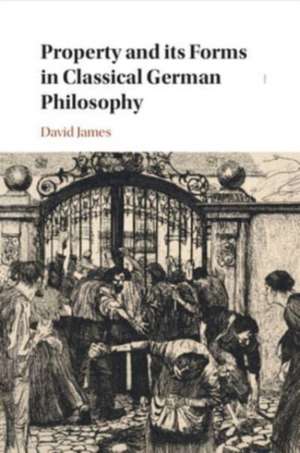Property and its Forms in Classical German Philosophy
Autor David Jamesen Limba Engleză Paperback – 12 sep 2024
| Toate formatele și edițiile | Preț | Express |
|---|---|---|
| Paperback (1) | 176.39 lei 3-5 săpt. | +11.33 lei 7-11 zile |
| Cambridge University Press – 12 sep 2024 | 176.39 lei 3-5 săpt. | +11.33 lei 7-11 zile |
| Hardback (1) | 580.11 lei 6-8 săpt. | |
| Cambridge University Press – 4 ian 2023 | 580.11 lei 6-8 săpt. |
Preț: 176.39 lei
Nou
Puncte Express: 265
Preț estimativ în valută:
33.75€ • 35.40$ • 28.10£
33.75€ • 35.40$ • 28.10£
Carte disponibilă
Livrare economică 11-25 martie
Livrare express 25 februarie-01 martie pentru 21.32 lei
Preluare comenzi: 021 569.72.76
Specificații
ISBN-13: 9781009288101
ISBN-10: 1009288105
Pagini: 215
Dimensiuni: 152 x 229 x 12 mm
Greutate: 0.3 kg
Ediția:Nouă
Editura: Cambridge University Press
ISBN-10: 1009288105
Pagini: 215
Dimensiuni: 152 x 229 x 12 mm
Greutate: 0.3 kg
Ediția:Nouă
Editura: Cambridge University Press
Cuprins
Introduction: 1. The mystery of the right to property; 2. The concept of property and forms of property; 3. Property, freedom and enlightenment: Kant's Rechtslehre; 4. Fichte on property and labour; 5. Property and ethical life: Hegel's system of right; 6. Equality, exchange value and individuality: Marx's critique of private property; Concluding remark; Bibliography; Index.
Recenzii
'Property and its Forms in Classical German Philosophy challenges the liberal, 'pre-political' conception of private property stemming from John Locke that is familiar and standard in contemporary political philosophy. The book examines and defends four alternative, powerful accounts of property-from Kant, Fichte, Hegel, and Marx-that have a social component to what is mine and thine. James's thorough, learned discussion contributes not only to our understanding of German political thought but also to fundamental inquiries into the nature and basis of modern liberal capitalism.' Jeffrey Church, University of Houston
'David James brilliantly demonstrates that, beyond their controversies about economic systems, classic German philosophers share the same concept of property. It isn't primarily a relation between a person and a thing, but a system of mutual limitation of free spheres of action. This opens highly promising perspectives for the current debates on distributive justice.' Jean-Christophe Merle, University of Vechta/Universität des Saarlandes
'David James brilliantly demonstrates that, beyond their controversies about economic systems, classic German philosophers share the same concept of property. It isn't primarily a relation between a person and a thing, but a system of mutual limitation of free spheres of action. This opens highly promising perspectives for the current debates on distributive justice.' Jean-Christophe Merle, University of Vechta/Universität des Saarlandes
